- Home
- Anne Mather
The Reluctant Governess Page 10
The Reluctant Governess Read online
Page 10
Victoria swung round wearing a rather sceptical expression. ‘Oh yes?’ she queried, with some sarcasm. ‘As well as whom?’
‘My mother, of course,’ answered Sophie, pulling an ugly face at her, and before Victoria could protest, she darted out of the room slamming the door behind her.
Victoria raised her eyes heavenward with exasperated annoyance. Really, the child was impossible! Just as you thought you were making some headway with her, she could accomplish a complete volte-face, leaving you with the unhappy realisation that you had achieved absolutely nothing.
With a sigh, she gathered their paraphernalia together, taking time to read some of Sophie’s work. Her writing was extraordinarily good for a child of her age, but it was obvious that towards the end of the day she had grown less interested. There were more mistakes, more untidiness, and little evidence of comprehension. Victoria shrugged. Considering Sophie had had little educational discipline for so long she had done quite well, and if one could dismiss her parting accusations as so much defiance it had not been an unsuccessful day.
When the desk was cleared and the room was tidy, Victoria walked back along the corridor to the hall. She half expected to find the Baron and his daughter there, but it was deserted and she could only assume they were still outside or perhaps in the kitchen. Not wanting to intrude, she went up to her room and without switching on the light she sat down in the glow of the fire to relax for a while before dinner. It was snowing again, but only gently, and she let her thoughts drift back to England and her life there.
Had Meredith succeeded in discovering her whereabouts yet? Surely he could not have done or he would have come after her. Or was she being unnecessarily conceited? He might consider her actions as a kind of betrayal; he might even now be back in the States.
But somehow she knew this wasn’t so. Meredith was not a man to give up so easily, and he had believed his power over her to be absolute. She gave a half-mischievous smile as she tried to imagine his immediate reactions to her disappearance. On her way to Reichstein it had been a little frightening to consider them, but now, after several days of self-analysis, she had realised how stupid it had been. After all, Meredith wasn’t the first man in her life, or anything momentous like that. There had never been a man who meant that much to her. In her position as Lady Pentower’s godchild, she had had plenty of opportunities to meet eligible bachelors, young and old, or rather middle-aged, but she had soon realised that there was much more to living with a man than merely running his home and bearing his children. And money had very little to do with that. When all the exciting places had been visited, and all the fashionable clothes bought, money became unimportant. All things were relative, she had discovered, and in six months all things became commonplace, no matter how exotic. It was one of the depressing anomalies of life which had to be experienced to be believed. She sighed, feeling a sense of gratitude towards Aunt Laurie for securing her this job. She admitted honestly to herself that she had been reluctant to come, but now that she was here she found it infinitely more satisfying than anything else she had ever attempted. Whatever their deficiencies, the people at Reichstein were real people, and not just cardboad imitations, manipulated by competitive relationships, with all the restrictions of convention breathing down their necks. Here life was a much more basic structure, and each day was more than just a struggle for survival in a power-controlled concrete jungle. She thought of what the Baron had said about his contemporaries, how they despised him for working at his inheritance instead of selling out and living a life without point or ambition. She could not imagine the present Baron von Reichstein being content with such a useless existence. Doubtless if such a situation had been forced upon him he would have taken up some other form of occupation, car-racing for example; anything to which he would have to pit his strength and intelligence, and possibly his life.
She leant forward to throw another log on the smouldering embers and saw that it was already dark. The snow was thickening and she reflected that her employer had just arrived home in time before it began. She wondered where he had been. To be away all day meant further than the village, she thought. And where was he now? With Sophie, no doubt, listening to her exaggerated descriptions of the work Victoria had made her do today. She was a strange child, so absorbed with creating difficulties that she forgot to enjoy living. Victoria hoped to change that in time. She had no illusions that her task would be an easy one, but at least today they had made some progress. To actually get Sophie working at a desk was no small achievement.
As usual, her thoughts turned to the puzzle of Sophie’s mother. She had discounted completely Sophie’s allusions to her imprisonment in the north tower. This was just another attempt on the child’s part to disturb her, for obviously Sophie was not yet convinced that Victoria was any different from her predecessors. All the same, the absence of the Baroness was curious, as was the Baron’s refusal to discuss his wife. It seemed likely that they were estranged and maybe it was as yet too painful to talk about, although she could not be certain of that either. The Baron in the main did not appear distrait as he surely would have done in those circumstances.
Victoria sighed and lay back in her chair. It was nothing to do with her really, as the Baron had said, except in so far as it impinged upon Sophie’s actions. Even so, she was curious in spite of herself, and her interest had little to do with the child. It was her employer himself who intrigued her, and the knowledge was rather disturbing. But then the Baron was rather a disturbing man …
She dressed for dinner with especial care. She told herself she was doing this simply out of the aesthetic pleasure it gave her, but subconsciously she was aware that at some time that evening the Baron would send for her to discuss Sophie’s behaviour, and she wanted to look her best.
So she chose a long velvet gown in a particularly attractive shade of amber that highlighted the tawny threads in her hair. With a faint grimace at her reflection, she decided to leave her hair loose, and it swung in a bell-like curve to her shoulders.
When she entered the kitchen, Maria stared at her in astonishment, and even Gustav removed his pipe from his mouth and rose to his feet gallantly. Victoria felt suddenly ridiculous. She was the employee here, not a guest, and her appearance must seem particularly futile to these two old servants.
But Maria swiftly recovered herself, and with a shrug of her bony shoulders, returned to her task of stirring the soup on the stove. Victoria hesitated, on the point of making some excuse to return to her room when the door opened and the Baron came in. He had been outside, his hair flecked with snow, and she shivered in the blast of cold wind his entry admitted into the warm room. His eyes went straight to the slim figure in the amber gown with its high caftan collar and long wide-cuffed sleeves, and a flicker of something stirred in his brilliant blue eyes.
Victoria inclined her head awkwardly, and then turned away, moving to Maria’s side, and saying in a low voice: ‘Is there anything I can do?’
Maria gave her a speculative look. ‘In that dress, fräulein? I think not.’ She glanced round at her employer. ‘You are ready for supper now, ja?’ Her voice was warm and welcoming.
‘Ja, Maria. Jetzt!’ The Baron removed the thick sheepskin coat he was wearing to reveal dark trousers and a thick green polo-necked sweater. He hung his coat on the hooks by the door, and then glanced across at Victoria again. ‘You are going out, fräulein?’ he questioned, frowning.
Victoria turned, hoping he would think the colour in her cheeks had been made by the heat of the fire. ‘No, Herr Baron. This—this is a warm dress. And I felt like a change from—from trousers.’
The Baron shrugged. ‘You do not have to explain yourself to me, fräulein,’ he remarked bleakly, but she knew he was not pleased with her appearance. ‘However, as you are obviously—unsuitably dressed for the kitchen of the Schloss Reichstein, I suggest you join me in my study for the meal.’
Victoria made a deprecatory gesture. ‘I—I didn�
��t expect that, Herr Baron,’ she protested uncomfortably.
He gave her an eloquent look. ‘Did you not, fräulein? Nevertheless, we will eat in my study. You have no objections, Maria?’
The old woman’s lips thinned, but she managed to make some indifferent response, and with a deliberately exaggerated bow, the Baron indicated that Victoria should precede him from the room. Victoria hesitated, glanced once at Maria, who seemed absorbed in her task, and then with a sigh walked ahead of her employer into the corridor beyond.
She expected Sophie to be waiting in the Baron’s study, but she was not, and when she made some polite comment on this, he said: ‘Sophie was tired. She had her meal earlier than usual, and is already in bed. I promised to go and say goodnight to her on my return from attending to the animals. Perhaps you will excuse me while I attend to that small task?’
‘Of course.’ Victoria spread her hands in an expressive movement, and with a slight bow of his head he left her there, closing the door firmly behind him.
After he had gone, Victoria seated herself in one of the leather armchairs, drawing it near to the roaring fire. It was a very comfortable room with the heavy curtains drawn across the tall windows and a standard lamp providing the only illumination apart from the flames. It looked entirely different from the schoolroom it had served as all day, and she wondered if the Baron spent all his evenings here. It seemed likely. The great hall was not the kind of apartment a person alone would choose. It was out of all proportion for everyday needs. It needed crowds of people, and maybe a small orchestra to play in the gallery. Victoria could picture how colourful the scene must have been years and years ago when the Barons von Reichstein were in their prime. There would be masques and balls, and the women would wear exquisite gowns made of brocade and silk. And the men’s clothes would be colourful, too, and sometimes perhaps a member of the royal family would stay and all the rooms would echo to the sound of the servants’ orders …
She was lost in thought and when the door of the study reopened to admit her host, she started involuntarily, unable for a moment to assimilate her surroundings. Then realisation came to her and she made her back a little straighter as the Baron came across to the fire. He had changed his thick sweater for a white shirt of heavy satin worn with a dark blue tie, a sleeveless embroidered jerkin of black velvet overall. He looked younger out of his dark clothes and Victoria wondered whether he had changed for her benefit. Somehow she doubted it.
‘Well, fräulein,’ he said now, in a cool tone, ‘can I offer you a drink before the meal? Wine, or perhaps a Martini?’
Victoria shook her head. ‘Thank you, but no, that’s not necessary,’ she replied quietly. ‘I don’t drink a lot.’
The Baron shrugged, and after giving her a brief speculative glance he went to pour himself some whisky. He came back to the fire with his drink, and stood sipping it, staring into the flames. Then his gaze travelled to Victoria again, and his eyes narrowed.
‘Sophie tells me that you have worked hard today—both of you,’ he added briefly.
Victoria folded her hands in her lap. ‘Sophie has worked very hard,’ she agreed. ‘She is by no means as behindhand as your words had led me to believe. She’ll catch up in no time. Her handwriting is particularly good.’
The Baron considered the liquid in his glass. ‘So you would say the first hurdle has been successfully negotiated?’
‘I think so, Herr Baron.’ Victoria frowned a little. ‘But please don’t imagine that I am under any misapprehension regarding Sophie’s attitude. I know there is still a long way to go. She is in no way convinced that I am any less susceptible than the other governesses.’
The Baron swallowed the remainder of his drink, and turned to pour himself another. ‘And you are, fräulein?’ he queried, rather sardonically.
Victoria coloured. ‘I think so.’
The Baron turned back to her. ‘You are certainly different, fräulein,’ he conceded, his eyes surveying her intently. ‘Exactly why did you choose to change for dinner?’
Victoria got to her feet, unable to sit still under such minute scrutiny. ‘As I told you, Herr Baron, I was tired of wearing trousers. And this dress is not particularly formal.’
‘A long dress is not formal?’
‘Of course not,’ she retorted defensively. ‘In England long dresses are very fashionable, for breakfast as well as dinner.’
‘Indeed? As you can see I am very out of date.’
Victoria could have said that his clothes were not particularly old-fashioned. On the contrary, he always looked right in what he wore, but that was because he had the height and breadth to wear almost anything with elegance. But she refrained from commenting on this, and said instead: ‘Actually, I wanted to ask you about Sophie’s clothes, Herr Baron.’
His eyes were bleak. ‘Oh, yes?’
‘Yes.’ Victoria hesitated, choosing her words with care. ‘Her clothes aren’t exactly—well—attractive, are they?’
‘Maria makes her dresses. She is an admirable knitter.’
Victoria sighed. ‘But do they have to be so plain—so practical? She needs bright colours to rake away the sallowness of her complexion! Something with style!’
‘Sophie has been complaining?’ The Baron was aloof.
‘Of course not. Sophie wouldn’t complain of anything to me! Heavens, I’m still arch-enemy number one!’
The Baron’s lips twitched slightly. ‘So this is your idea. Another attempt, perhaps, to win her confidence?’
‘Something like that.’ Victoria hunched her shoulders. ‘Oh, what’s the use, I can tell from your expression that you’re not impressed.’
The Baron’s eyes darkened. ‘Is this also the way one addresses one’s employer in England?’ he enquired icily.
Victoria bent her head. ‘I wouldn’t know,’ she replied, impatiently. ‘I never employed anybody!’
‘You are insolent, fräulein!’ His nostrils flared and she was reminded of a story she had once read about a prince and a peasant girl. Certainly the present Baron von Reichstein had his moments of dignity and this was one of them.
With a sigh, she said: ‘I don’t mean to be. I just find your attitude rather stultifying!’
The Baron’s face was forbidding. ‘Stultifying, fräulein? In what way is this so?’
Victoria felt as though she was wading deeper and deeper into icy water. ‘Well,’ she began awkwardly, ‘Sophie’s problems can’t all be solved in the schoolroom—--’
‘But they are the only problems which need concern you, surely, fräulein?’ he snapped.
Victoria stared at him impatiently. ‘Why is it that one minute you can be calm and reasonably pleasant, and the next you positively blow up in my face?’ she cried. ‘I’m not trying to probe into your private affairs, I just want to help Sophie in every way I can!’
The Baron was absolutely furious now. She could see it in the brilliant glacier quality of his eyes, in the harshness of his mouth, and in the deep lines etched beside it. He swallowed the second glass of whisky he had poured himself at a gulp, and replaced the glass on the table with a definite click. Then he straightened.
‘You can best help Sophie and yourself, fräulein, by confining your activities to academics!’ he bit out harshly. ‘I will not be dictated to by a slip of a girl who has not been at Reichstein a week yet!’
Victoria compressed her lips. ‘I was not trying to dictate to you,’ she protested resignedly. ‘It’s simply that while I believe in my methods, you have to believe in them, too!’
‘What is that supposed to mean, fräulein?’ he queried coldly.
‘I couldn’t possibly expect you to understand,’ she retorted, losing all patience. Twisting her hands together, she crossed the room restlessly, her hair swinging silkily against her cheek. ‘I think it would be as well if I ate in the kitchen after all.’
The Baron moved swiftly for such a big man, and he was at the door before her, leaning back against it, his arm
s folded. ‘Oh no, fräulein,’ he said, regarding her with dispassionate appraisal. ‘In spite of your youthful audacity, you intrigue me, and besides, we cannot waste that gown, can we?’
Victoria’s cheeks burned. ‘You are mocking me now, Herr Baron,’ she said, in a taut angry tone. ‘Please move away from the door. I wish to leave.’
The Baron hesitated for a moment, and then with a slight movement of his shoulders he stepped aside. But even as he did so, there was a knock at the door, and Victoria turned hastily away to the fire as her employer stepped forward to open it. Her knees were shaking a little and she had no desire for Maria to witness her distress.
Maria came into the room carrying a large tray and deposited it on the desk. ‘I’ll bring your coffee later, Herr Baron,’ she said, casting a look in Victoria’s direction with ill-concealed curiosity. ‘Perhaps the fräulein will serve the meal.’
The Baron gave her a warm smile. ‘I am sure we can cope, thank you, Maria,’ he said gently, and Victoria could hardly believe that this was the same man who had been verbally lashing her a few moments ago.
The elderly servant departed and the Baron closed the door firmly behind her. ‘Well, fräulein,’ he remarked sardonically, ‘it appears you are not to have a choice regarding your place of eating dinner. Unless, of course, you wish to brave Maria’s wrath by carrying your meal back to the kitchen.’
Victoria bent her head. ‘I’m not particularly hungry, Herr Baron,’ she retorted tightly.
The Baron came across to the desk and examined the contents of the tray. ‘Come, fräulein,’ he chided her mockingly, ‘Maria has prepared us a delicious meal. There is a good beef broth and an Austrian speciality—Wiener Schnitzel. Have you ever tasted Wiener Schnitzel?’
Victoria gave him an exasperated stare. ‘I take it our disagreement has been dismissed,’ she asked daringly.
The Baron gave her a faint frown. ‘Eat,’ he said briefly. ‘Then we will talk.’

 A Forbidden Temptation
A Forbidden Temptation Dark Castle
Dark Castle Hell Or High Water
Hell Or High Water Jake Howard's Wife
Jake Howard's Wife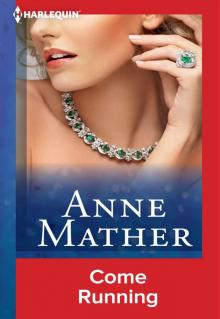 Come Running
Come Running The Arrogant Duke
The Arrogant Duke Sweet Revenge
Sweet Revenge Passionate Protectors?
Passionate Protectors? Savage Awakening
Savage Awakening Come the Vintage
Come the Vintage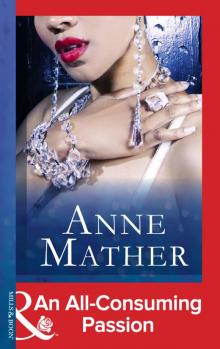 An All-Consuming Passion
An All-Consuming Passion A Fever In The Blood
A Fever In The Blood The Shrouded Web
The Shrouded Web A Haunting Compulsion
A Haunting Compulsion Duelling Fire
Duelling Fire Edge of Temptation
Edge of Temptation Wild Enchantress
Wild Enchantress The Brazilian Millionaire's Love-Child
The Brazilian Millionaire's Love-Child Captive Destiny
Captive Destiny The Pregnancy Affair
The Pregnancy Affair The Sanchez Tradition
The Sanchez Tradition A Passionate Affair
A Passionate Affair Sinful Truths
Sinful Truths Stay Through the Night
Stay Through the Night Seen by Candlelight
Seen by Candlelight No Gentle Possession
No Gentle Possession His Forbidden Passion
His Forbidden Passion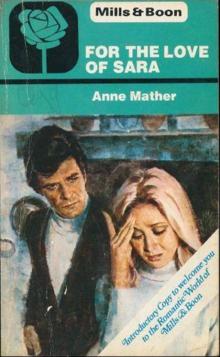 For the Love of Sara
For the Love of Sara A Trial Marriage
A Trial Marriage Melting Fire
Melting Fire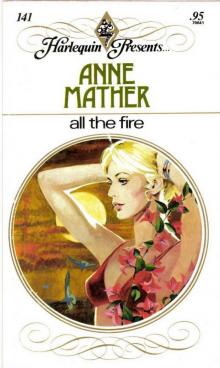 All The Fire
All The Fire Bedded For the Italian's Pleasure
Bedded For the Italian's Pleasure All Night Long
All Night Long The Japanese Screen
The Japanese Screen Rich as Sin
Rich as Sin Smokescreen
Smokescreen Dangerous Rhapsody
Dangerous Rhapsody Brittle Bondage
Brittle Bondage A Savage Beauty
A Savage Beauty Castles of Sand
Castles of Sand A Distant Sound of Thunder
A Distant Sound of Thunder THE VIRGIN'S SEDUCTION
THE VIRGIN'S SEDUCTION White Rose of Winter
White Rose of Winter Proud Harvest
Proud Harvest The Legend of Lexandros
The Legend of Lexandros Country of the Falcon
Country of the Falcon Diamond Fire
Diamond Fire Stormspell
Stormspell Legacy of the Past
Legacy of the Past Such Sweet Poison/Blind Passion
Such Sweet Poison/Blind Passion The Baby Gambit
The Baby Gambit The Smouldering Flame
The Smouldering Flame Autumn of the Witch
Autumn of the Witch Rachel Trevellyan
Rachel Trevellyan Dangerous Sanctuary
Dangerous Sanctuary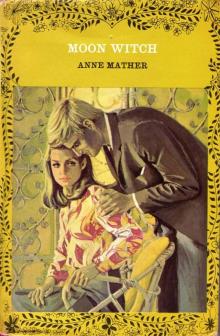 Moon Witch
Moon Witch An Heir Made in the Marriage Bed
An Heir Made in the Marriage Bed Images Of Love
Images Of Love Innocent Obsession
Innocent Obsession Tidewater Seduction
Tidewater Seduction Pacific Heat
Pacific Heat Take What You Want
Take What You Want The Spaniard's Seduction
The Spaniard's Seduction The High Valley
The High Valley A Woman of Passion
A Woman of Passion The Reluctant Governess
The Reluctant Governess Charade in Winter
Charade in Winter Mendez’s Mistress
Mendez’s Mistress Dark Moonless Night
Dark Moonless Night The Greek Tycoon's Pregnant Wife
The Greek Tycoon's Pregnant Wife The Autumn of the Witch
The Autumn of the Witch Night Heat
Night Heat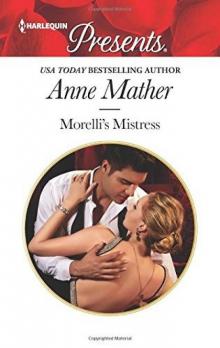 Morelli's Mistress (Harlequin Presents)
Morelli's Mistress (Harlequin Presents) Jack Riordan's Baby
Jack Riordan's Baby Beware the Beast
Beware the Beast Born Out of Love
Born Out of Love Greek Affairs in his Bed: Sleeping with a StrangerBlackmailed into the Greek Tycoon’s BedBedded by the Greek Billionaire
Greek Affairs in his Bed: Sleeping with a StrangerBlackmailed into the Greek Tycoon’s BedBedded by the Greek Billionaire Green Lightning
Green Lightning Guilty
Guilty Snowfire
Snowfire Moondrift
Moondrift Stolen Summer
Stolen Summer Such Sweet Poison
Such Sweet Poison Dark Venetian
Dark Venetian Innocent Sins
Innocent Sins Baby Out of the Blue
Baby Out of the Blue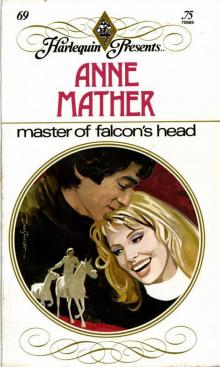 Master of Falcon's Head
Master of Falcon's Head Rooted in Dishonour
Rooted in Dishonour A Secret Rebellion
A Secret Rebellion The Forbidden Mistress
The Forbidden Mistress Dangerous Enchantment
Dangerous Enchantment The Judas Trap
The Judas Trap Burning Inheritance
Burning Inheritance Forbidden Flame
Forbidden Flame Who Rides the Tiger
Who Rides the Tiger Impetuous Masquerade
Impetuous Masquerade Fallen Angel
Fallen Angel Act of Possession
Act of Possession Dangerous Temptation
Dangerous Temptation Pale Dawn Dark Sunset
Pale Dawn Dark Sunset Dark Enemy
Dark Enemy Innocent Virgin, Wild Surrender
Innocent Virgin, Wild Surrender Follow Thy Desire
Follow Thy Desire Sandstorm
Sandstorm Apollo's Seed
Apollo's Seed Whisper Of Darkness
Whisper Of Darkness A Wild Surrender
A Wild Surrender A Dangerous Taste of Passion
A Dangerous Taste of Passion The Night Of The Bulls
The Night Of The Bulls Hot Pursuit
Hot Pursuit The Longest Pleasure
The Longest Pleasure An Elusive Desire
An Elusive Desire Storm In A Rain Barrel
Storm In A Rain Barrel